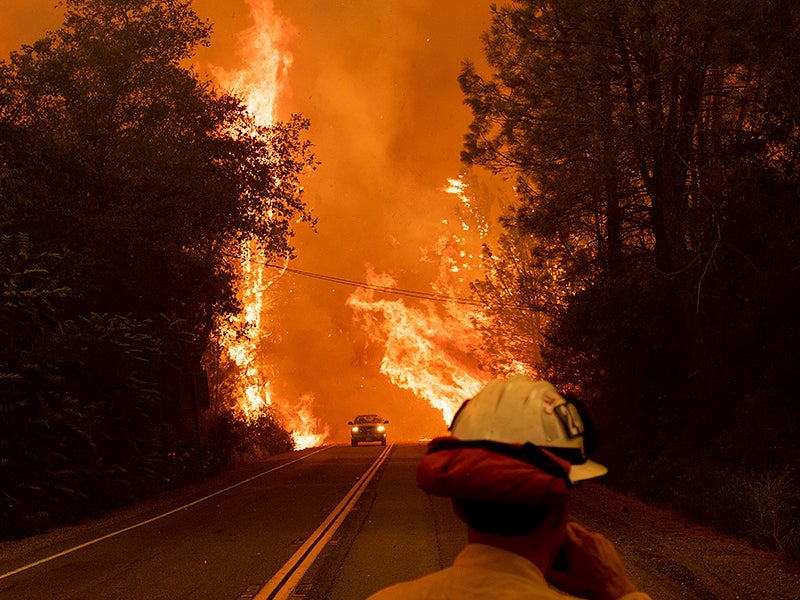California Fires Signal Need for Climate Action
The Trump administration and House Republicans are using the fires across the West as an excuse to chip away at bedrock environmental laws.

This page was published 5 years ago. Find the latest on Earthjustice’s work.
Western wildfires have been growing more intense, culminating this year in the deadliest blaze in California’s history. Climate change is driving this trend.
With increasingly hot weather and deeper droughts, forests are becoming drier and prone to burning throughout the year. Over the past 30 years, climate change has doubled the area affected by forest fires in the western U.S., according to a study that appeared in the 2016 Proceedings of the National Academies of Sciences. Fifteen out of the 20 worst fires in California’s history have occurred since 2000.
As Daniel Berlant, assistant deputy director of CAL FIRE, California’s fire agency, told the New York Times: “Let’s be clear. It’s our changing climate that is leading to more severe and destructive fires.”
At Earthjustice, we’re fighting for a swift and just transition away from fossil fuels towards 100 percent clean energy. California recently committed to 100 percent clean energy by 2045. The rest of the country must follow its lead to safeguard our health, homes, and economy from these disasters.
But instead of adopting policies that could reduce the risks of extreme weather for hundreds of millions of people, the Trump administration has seized the destruction across the West as an opportunity to help line the pockets of special interests and push for more logging in our forests.
U.S. Interior Secretary Ryan Zinke wrote recently that “radical environmentalists would rather see forest and communities burn than see a logger in the woods.” In Zinke’s zero-sum equation, the devastating wildfires in California would stop if those radical environmentalists would let the timber industry cut down more trees.
The truth is that Zinke and House Republicans are using the destruction across the West as an excuse to chip away at bedrock environmental laws created to ensure that science drives decisions about the future of our nation’s forests.
Everyone agrees that we must protect homes and lives from the catastrophic effects of fires, but Zinke’s argument is dangerously oversimplified, cynically disingenuous and downright false. And that’s not the worst part. He also proclaims that climate change has “nothing to do” with these wildfires, even as scientists and firefighting officials unanimously assert that climate change is creating the conditions that allow destructive wildfires to thrive. These types of fires will only grow in intensity and frequency if we do nothing to address climate change.
Zinke’s preferred strategy involves bowing to special interests and clearcutting large swaths of trees, following the false logic that aggressively eliminating trees means fewer trees to burn. In fact, clearcutting leaves highly-flammable slash on the forest floor; leads to younger, less diverse forests that are more susceptible to fire; and encourages roadbuilding that becomes a source for fire ignition.
Clearcutting also happens to be the way that the timber industry turns a profit.
Zinke has been espousing this argument as Congress negotiates the 2018 Farm Bill, which funds our nation’s food security, nutrition and conservation programs. The House version of this bill includes provisions that would exempt large-scale logging in our national forests from environmental review and public input while reducing Endangered Species Act consultation requirements.
If these proposals were to make it into the final bill, they would change the way that our national forests are currently managed, pushing aside science and public input to push forward timber industry interests above the interests of communities, recreation and ecology. Provisions in the House bill that aim to fast-track commercial logging and road building could increase fire risk and create additional dangers for surrounding communities, such as erosion and mudslides.
Zinke’s false assertion that large-scale logging is our best fire prevention strategy hasn’t been the only attempt by the Trump administration to use the deadly California wildfires to misinform the American public. President Trump tweeted on Nov. 10 that there is no reason for the fires except “gross mismanagement of the forests.” He went on to threaten to end federal government expenditures tied to wildfires. California Professional Firefighters called the tweet “dangerously wrong.”
All of this is nothing new for Zinke and the Trump administration, which continues to wage an all-out campaign to subvert science and deny the existence of climate change. For the tens of thousands of people forced to evacuate their homes, and the many firefighters who are risking their lives, climate change is very real. They are counting on us to fight for wildfire risk reduction strategies that address the real reasons these fires are burning — before it’s too late.
A senior legislative representative, Blaine works with Congress, federal agencies, and partner organizations to protect public lands and advance environmental health.
Established in 1989, Earthjustice's Policy & Legislation team works with champions in Congress to craft legislation that supports and extends our legal gains.
